Japan-Czech Republic Relations
Japan-Czech Summit Meeting
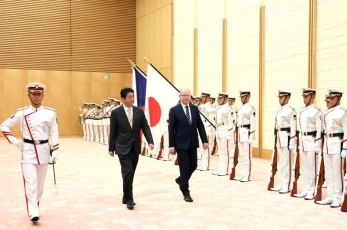 (Photo: Cabinet Public Relations Office)
(Photo: Cabinet Public Relations Office)
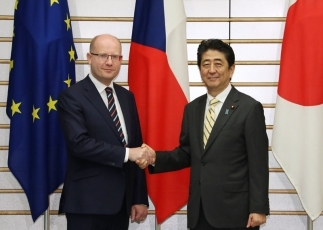 (Photo: Cabinet Public Relations Office)
(Photo: Cabinet Public Relations Office)
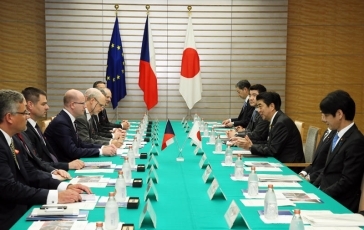 (Photo: Cabinet Public Relations Office)
(Photo: Cabinet Public Relations Office)
On June 27, commencing at 6:00 p.m. for approximately 40 minutes, Mr. Shinzo Abe, Prime Minister of Japan, held a meeting with H.E. Mr. Bohuslav Sobotka, Prime Minister of the Czech Republic, who is making an official working visit to Japan. The overview of the meeting is as follows.
Following the summit meeting, a signing ceremony for the “Agreement between the Government of Japan and the Government of the Czech Republic regarding Working Holiday Visas” (English(PDF) /Czech(PDF)
/Czech(PDF) / Japanese (PDF)
/ Japanese (PDF) ) took place in the presence of the two leaders, and then exchange ceremonies were held for ” the Action Plan for FY 2017 “between the Japan External Trade Organization (JETRO) and CzechInvest (the Czech Republic’s Investment and Business Development Agency), and for a reinsurance agreement between Nippon Export and Investment Insurance (NEXI) and the Czech Republic’s Export Guarantee and Insurance Corporation (EGAP).
) took place in the presence of the two leaders, and then exchange ceremonies were held for ” the Action Plan for FY 2017 “between the Japan External Trade Organization (JETRO) and CzechInvest (the Czech Republic’s Investment and Business Development Agency), and for a reinsurance agreement between Nippon Export and Investment Insurance (NEXI) and the Czech Republic’s Export Guarantee and Insurance Corporation (EGAP).
Prime Minister Abe then hosted a dinner where the two leaders exchanged views on a broad range of topics including the economy and cultural exchanges in a relaxed atmosphere.
1. Opening remarks
At the beginning, Prime Minister Abe welcomed Prime Minister Sobotka to Japan, along with stating that amid the various problems facing the international community he hopes to further strengthen the cooperative relationship with the Czech Republic, with which Japan shares universal values such as freedom, democracy and human rights.
In response, Prime Minister Sobotka stated that he is delighted to be realizing his visit to Japan this year, the 60th anniversary of the restoration of diplomatic relations between the two countries, along with explaining that he hopes this visit will be an opportunity to further advance the partnership with Japan.
2. Bilateral relations
Prime Minister Abe expressed happiness that approximately 250 Japanese companies operate businesses in the Czech Republic and have been contributing to the Czech economy, and welcomed the progress of cooperation in the field of industrial technologies, including nuclear power, against the backdrop of the two countries’ high technologies.
Prime Minister Sobotka mentioned that many Japanese companies are active within the Czech Republic and are performing roles in its economic growth, and expressed expectation over the activities of Japanese companies in the future too.
In addition, the two leaders welcomed the signing of the Agreement on a Working Holiday Visas to promote mutual understanding among young people. Furthermore, the two leaders shared the view that they will encourage a closer trade and economic relationship, and will also further deepen cooperation between the two governments also, including dialogue and cooperation between defense authorities.
3. Cooperation on regional affairs and in the international arena
(1) General remarks
With regard to the attempts to unilaterally change the status quo that are occurring worldwide at the moment, the two leaders fully shared the view that maintaining international order based on international law is essential for the peaceful and stable development of the international community.
(2) East Asia situation
The two leaders exchanged views widely on the East Asia situation. With regard to North Korea, they shared the recognition that the international community as a whole should intensify pressure on North Korea in order to halt its nuclear and missile development, and confirmed they will also cooperate on resolving the abductions issue.
(3) Japan-Europe relations
The two leaders shared the view that amid protectionist moves worldwide, it will be important to promptly reach an agreement in principle on the Japan-European Union (EU) Economic Partnership Agreement (EPA). Prime Minister Abe requested that attention be given to ensuring that the global economy and the activities of Japanese companies are not negatively affected by the United Kingdom’s exit from the EU. Prime Minister Sobotka stated that the EU is moving ahead with the exit negotiations with the UK, but hopes to be able to continue to maintain free trade with the U.K.
In addition, the two leaders highly appreciated the cooperation in the Visegrad Group (V4) plus Japan framework thus far, and confirmed that the two countries will further coordinate in the V4 plus Japan framework in order to continue to respond in unison to the international community’s challenges.
[Reference] Visegrad Group (V4)
A framework for regional cooperation involving Poland, the Czech Republic, Slovakia and Hungary that was founded in Visegrad, Hungary in 1991. In addition to holding foreign minister-level and senior working-level dialogues with Japan, V4 plus Japan cooperation is also being pursued in fields such as the economy and promoting investment, development cooperation, climate change, energy conservation and the Eastern Partnership.
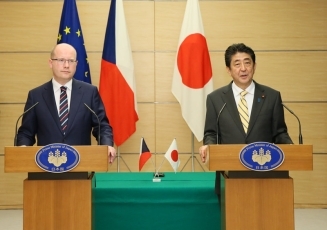 (Photo: Cabinet Public Relations Office)
(Photo: Cabinet Public Relations Office)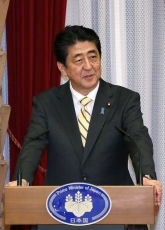 (Photo: Cabinet Public Relations Office)
(Photo: Cabinet Public Relations Office)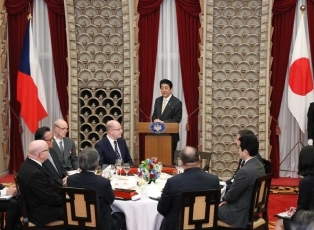 (Photo: Cabinet Public Relations Office)
(Photo: Cabinet Public Relations Office)

